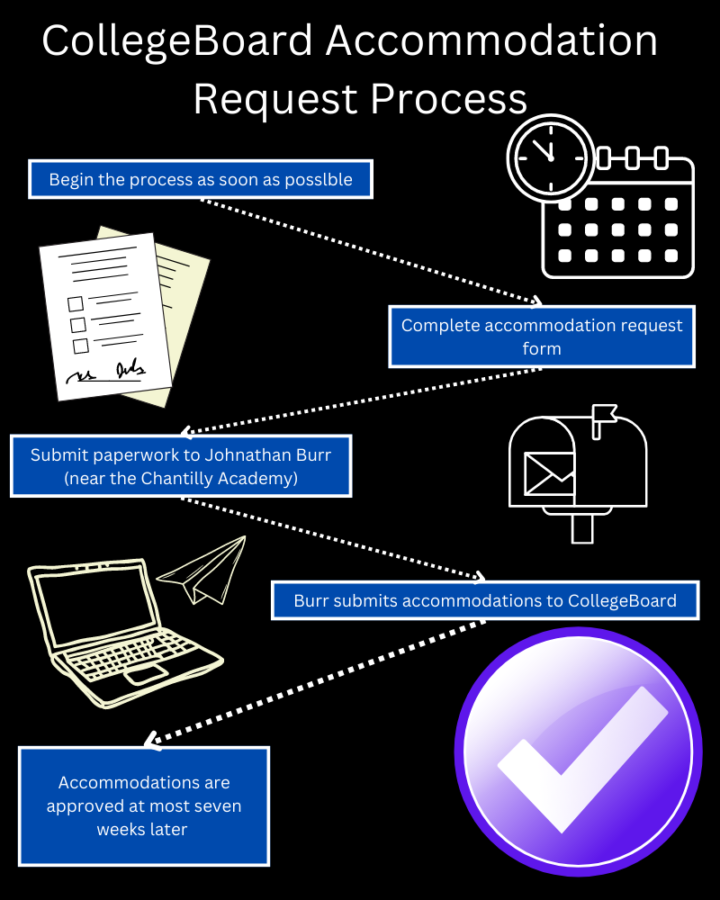Testing accommodation process frustrates students
January 3, 2023
As a high school student who has an individualized educational plan (IEP), sophomore Stephanie Nicholson needs to request accommodations when preparing for standardized tests administered by CollegeBoard. These accommodations are essential and completely change the test-taking experience for Nicholson and the 7.2 million other students in the U.S. who need testing accommodations, according to the National Center for Education Statistics.
“During the PSAT, I would stop reading because I was like ‘I don’t want to keep doing it’ and I’d have no motivation to do it because I didn’t really understand what was happening,” Nicholson said. “There were so many different passages and I got distracted.”
Read on demand was one of the accommodations Nicholson requested for the 2022 PSAT, but did not receive in time for the exam. According to Nicholson, passages are easier for her to follow when they are read to her. This means she can devote all of her mental power to following the passage, rather than the mechanics of individual words. The purpose of accommodations for students with disabilities is to offer equity for those who have alternative needs, according to special education case manager Rich Sarhanis.
Accommodations are not only offered to students with disabilities but to those who have chronic illnesses as well. Senior Shiri Feil lives with multiple chronic illnesses and has a 504 plan which provides accommodations to offset disadvantages she may experience as a result of her health. However, a $100 doctor’s note is required to receive accommodations with CollegeBoard; she did not apply because of this cost.
“My health was really great over the summer and I took the SAT in August,” Feil said. “I felt really great when I woke up that morning, I felt great throughout the test and my dad asked ‘how’d it go?’ And I was like ‘I feel great.’ I was happy with it. Then I took the one in school and I had a migraine that day. I was taking the SAT and I knew I was doing significantly worse than I had the first time.”
Services for students with disabilities coordinator Johnathan Burr recommends students apply to CollegeBoard as soon as they know they will be taking a test of theirs. He suggests students allow at least seven weeks prior to the test date for the accommodations request to be processed.
Burr says emails should have been sent from FCPS and CHS in August and that students and their families were meant to be reminded of this in their yearly IEP or 504 plan meetings. Despite this, many students were unaware of the process until it was too late.
“I have an IEP for ADHD but they didn’t really tell me about the SAT, CollegeBoard stuff,” sophomore Leah Thorn said. “They only told me once I was in there. I asked and they were like ‘no, you have to apply to CollegeBoard.’ It was a bummer because I don’t even know. I heard nothing about getting extended time.”
According to Sarhanis, scores reflected in tests given without necessary accommodations are inaccurate representations of a student’s academic abilities. Thorn is confident that if she were allowed extended time, she would receive a more accurate score. Similarly, Feil expects a lower score on her more recent SAT than her first one and attributes this to the combination of her health and lack of accommodations.
“That’s not for lack of knowledge or lack of understanding, it’s because of my health that day,” Feil said, “I couldn’t stand up and walk around, get my blood circulating because I didn’t have those accommodations.”
When asked how FCPS and CollegeBoard can improve, Nicholson suggested more clear communication and other interviewees agreed. They suggested more guidance from special education professionals while introducing families to the mechanics of CollegeBoard. This would simplify the process for those who are new to it.
CollegeBoard operates under the Americans with Disabilities Act (ADA), rather than the Individuals with Disabilities Education Act (IDEA) which supports IEPs and 504 plans. Because the process of requesting accommodations – while doable – is different from what most students have experienced before, Thorn, like Nicholson, suggests more direct support for students and their families while they navigate the process.
“I heard nothing about getting extended time, like nobody told me about anything,” Thorn said. “That could have been better. It’s maybe not uncoordinated, but not helpful.”



